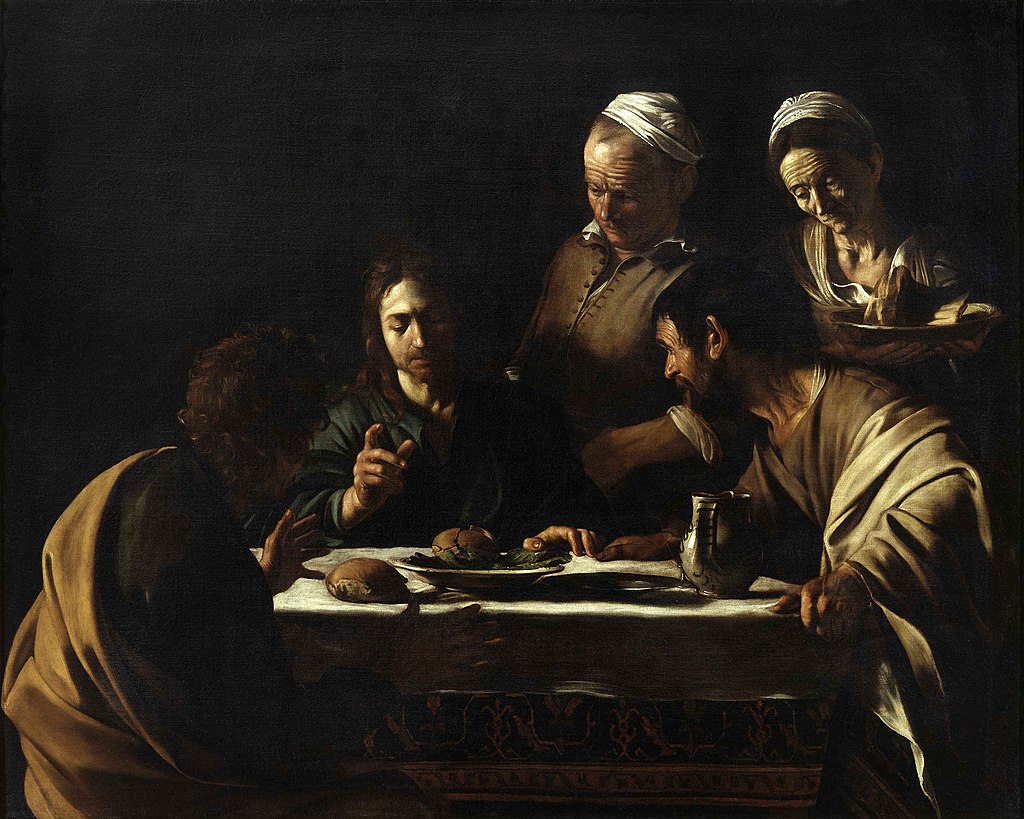|
Without Meaning To Christ’s finger, raised as if He meant to stress a point of argument, might be aimed at us. An accusation, perhaps. This is after the painter, without meaning to, had killed Ranuccio, which might account for the more sorrowful tenor of this version. Maybe, in fact, that could be guilt on Christ’s countenance, and not pity for those he’ll leave again. Who’s being accused, and of what? Guilt can be so relative. ** Ruin See how the hands of the man who leans in towards Christ cling fast to the table as if he knows already what’s to come and needs the certainty of the wood. Ironic, as it was wood Christ found himself nailed to, hung up to evince suffering for all to see. Often it’s what we hold on to that ruins us. Often we can’t let it go, even as we can’t help but notice everything beginning to fall apart. ** Illumination What must it have been like to realize god had not died on a miserable stalk of wood staked into the ghastly earth of a stark hill that had been named after a skull. For this truth to have been revealed by the breaking of bread with crust so dry it sounded almost like a bone being pierced with a spike. So much of what we love can be illuminated by being connected to some kind of suffering. ** Still Enough Though the bread is breaking, Christ hasn’t yet broken anything, and so hasn’t been revealed as the god who had been broken on that tormented spectre of a tree just days before, the figure Cleophas and the other had told him stories of as they walked together to Emmaus. This is the moment the miraculous is still to come, and the mundane is still enough to tell us all we need to know. ** Of Miracles We Are How much is forgiven by the darkness that surrounds us whatever light we find ourselves in? Can it be enough to talk into the night no matter how tired we are, telling of miracles we are desperate to believe might mean something more is always just about to happen to make sense of it all? Is there enough water to wash us clean of sin, or wine enough to rinse out every rancid taste? George Looney These poems are part of a manuscript of ekphrastic poems based on paintings by Caravaggio. In the manuscript, there are five poems on each painting, each poem being ten lines long with each line having exactly ten syllables. George Looney: "My books include the just-released Ode to the Earth in Translation (Red Mountain Press), a collection of stories, The Worst May Be Over, which won the Elixir Press Fiction Award, The Itinerate Circus: New and Selected Poems 1995-2020 (Red Mountain Press), the Red Mountain Press Poetry Award-winning What Light Becomes: The Turner Variations, the novel Report from a Place of Burning which was co-winner of The Leapfrog Press Fiction Award, Hermits in Our Own Flesh: The Epistles of an Anonymous Monk (Oloris Publishing, 2016), Meditations Before the Windows Fail (Lost Horse Press, 2015), the book-length poemStructures the Wind Sings Through (Full/Crescent Press, 2014), Monks Beginning to Waltz (Truman State University Press, 2012), A Short Bestiary of Love and Madness (Stephen F. Austin State University Press, 2011), Open Between Us (Turning Point, 2010), The Precarious Rhetoric of Angels (2005 White Pine Press Poetry Prize), Attendant Ghosts (Cleveland State University Press, 2000),Animals Housed in the Pleasure of Flesh (1995 Bluestem Award), and the 2008 Hymn of Ash (the 2007 Elixir Press Fiction Chapbook Award). I am the founder of the BFA in Creative Writing Program at Penn State Erie, editor-in-chief of the international literary journal Lake Effect, translation editor of Mid-American Review, and co-founder of the original Chautauqua Writers’ Festival.
0 Comments
Your comment will be posted after it is approved.
Leave a Reply. |
The Ekphrastic Review
COOKIES/PRIVACY
This site uses cookies to deliver your best navigation experience this time and next. Continuing here means you consent to cookies. Thank you. Join us on Facebook:
Tickled Pink Contest
April 2024
|




